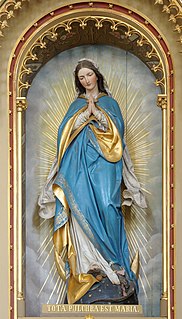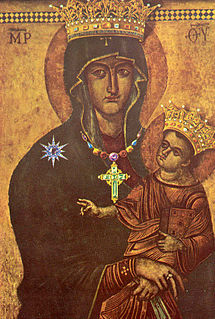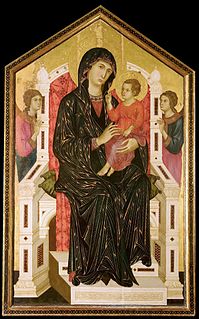
Pope Benedict XV, born Giacomo Paolo Giovanni Battista della Chiesa, was head of the Catholic Church from 1914 until his death in 1922. His pontificate was largely overshadowed by World War I and its political, social, and humanitarian consequences in Europe.

Queen of Heaven is a title given to the Virgin Mary, by Christians mainly of the Catholic Church and, to a lesser extent, in Anglicanism, Lutheranism, and Eastern Orthodoxy.

The following are Roman Catholic prayers to Saint Joseph.

Summi Pontificatus is an encyclical of Pope Pius XII published on 20 October 1939. The encyclical is subtitled "on the unity of human society". It was the first encyclical of Pius XII and was seen as setting "a tone" for his papacy. It critiques major errors at the time, such as ideologies of racism, cultural superiority and the totalitarian state. It also sets the theological framework for future encyclical letters, such as Mystici corporis Christi (1943). The encyclical laments the destruction of Poland, denounces the Molotov-Ribbentrop Pact, and calls for a restoration of independent Poland.
Anni sacri issued on the twelfth anniversary of his coronation, is an encyclical of Pope Pius XII on a program combating atheism.

Deiparae Virginis Mariae, is an encyclical of Pope Pius XII released in 1946 addressed to all Catholic bishops on the possibility of defining the Assumption of the Blessed Virgin Mary as a dogma of faith.
Luctuosissimi eventus, issued October 28, 1956, is an encyclical of Pope Pius XII urging public prayers for peace and freedom for the people of Hungary.
Veritatem facientes is an apostolic letter of Pope Pius XII to the Catholic faithful of Romania, protesting against their persecution and the virtual eradication of the Catholic Church in their country. The letter asks for courage and prayers.

Fulgens corona is an encyclical by Pope Pius XII, given at St. Peter's, Rome, on 8 September 1953, the Feast of the Nativity of the Blessed Virgin Mary, in the fifteenth year of his Pontificate. The encyclical proclaims a Marian year for 1954, to commemorate the centenary of the definition of the dogma of the Immaculate Conception of the Virgin Mary.

The theology of Pope Pius XII is reflected in his forty-one encyclicals, as well as speeches and nearly 1000 messages, during his almost 20-year pontificate. The encyclicals Mystici corporis and Mediator Dei advanced the understanding of membership and participation in the Catholic Church. The encyclical Divino afflante Spiritu began opening the door to historical-critical biblical studies. But his magisterium was far larger and is difficult to summarize. In numerous speeches Catholic teaching is related to various aspects of life, education, medicine, politics, war and peace, the life of saints, Mary, the mother of God, things eternal and temporal.

Ingruentium malorum is an encyclical of Pope Pius XII on reciting the rosary, issued on September 15, 1951, the Feast of the Seven Sorrows of the Virgin Mary. "It is an appeal for an intensification of the traditional October Rosary devotions, making a particular recommendation for the family recitation of the Rosary, begging Our Lady to obtain peace for individuals, for families, for peoples, for nations, and for the Church throughout the world."

The Mariology of the popes is the theological study of the influence that the popes have had on the development, formulation and transformation of the Roman Catholic Church's doctrines and devotions relating to the Blessed Virgin Mary.
Communium interpretes dolorum is an encyclical by Pope Pius XII at the ending of World War II in Europe, appealing for prayers for peace during May, given at Rome, at St. Peter's on Sunday 15 April 1945, in the seventh year of his pontificate.
Mirabile illud is an encyclical of Pope Pius XII on the crusade of prayer for peace, given at Rome from St. Peter's on the 6 December 1950, the twelfth year of his Pontificate.

Mariological papal documents have been a major force that has shaped Roman Catholic Mariology over the centuries. Mariology is developed by theologians on the basis not only of Scripture and Tradition but also of the sensus fidei of the faithful as a whole, "from the bishops to the last of the faithful", and papal documents have recorded those developments, defining Marian dogmas, spreading doctrines and encouraging devotions within the Catholic Church.

Le pèlerinage de Lourdes is the only encyclical of Pope Pius XII issued in French. It includes warnings against materialism on the centenary of the apparitions at Lourdes. It was given at Rome, from St. Peter's Basilica, on the feast of the Visitation of the Most Holy Virgin, July 2, 1957, the nineteenth year of his pontificate.
Optatissima pax is an encyclical of Pope Pius XII on prescribing public prayers for social and world peace given at Rome, at St. Peter's, the 18th day of December in the year 1947, the ninth of his pontificate.

The relations between Pope Pius XII and Judaism have long been controversial, especially those questions that surround Pope Pius XII and the Holocaust. Other issues involve Pius's Jewish friendships and his attitude towards the new state of Israel.
Christi Matri is an encyclical by Pope Paul VI issued on 15 September 1966 to encourage the faithful to pray for peace by way of the customary special devotions during the month of October, traditionally dedicated in honor of the Most Blessed Virgin.










